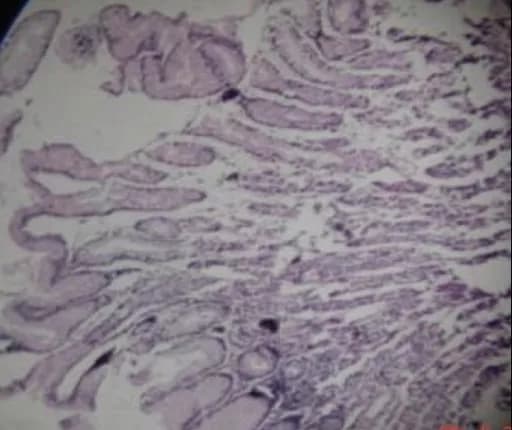What are the other Names for this Condition? (Also known as/Synonyms)
- Hypoproteinemic Hypertrophic Gastropathy
- Menetrier’s Disease
- Protein-Losing Gastroenteropathy (caused by Giant Hypertrophic Gastritis)
What is Giant Hypertrophic Gastritis? (Definition/Background Information)
- Giant Hypertrophic Gastritis (GHG) is a rare, inherited, chronic disorder that is characterized by:
- An overgrowth of the stomach lining
- Hypoalbuminemia (low blood serum level of albumin)
- Excess mucus secretion in the stomach
- Decreased acid secretion by the stomach
- The low level of acid secretion results in a failure to digest proteins and absorb nutrients, leading to diarrhea, weight loss, and peripheral edema
- The cause of the condition is unknown and currently there is no method to prevent Giant Hypertrophic Gastritis (also known as Menetrier’s Disease)
- GHG chronic disorder is diagnosed through an endoscopy with gastric biopsy. A treatment of this type of gastritis involves both non-surgical and surgical measures (in severe cases)
- The prognosis of Giant Hypertrophic Gastritis is generally excellent with appropriate treatment
Who gets Giant Hypertrophic Gastritis? (Age and Sex Distribution)
- Giant Hypertrophic Gastritis affects both children and adults. In adults, the onset is usually between 30-60 years of age; with males being 3-times more commonly affected, than females
- Although the disease is essentially the same in children, there have been reported associations between this disorder and recent respiratory as well as cytomegalovirus infections
What are the Risk Factors for Giant Hypertrophic Gastritis? (Predisposing Factors)
While Giant Hypertrophic Gastritis is typically considered a genetic disease, the underlying risk factors are not well-understood. In children, the condition has been linked to the following factors:
- Recent respiratory tract infections
- Helicobacter pylori infections
- Cytomegalovirus (CMV) infections
- Peripheral blood eosinophilia
It is important to note that having a risk factor does not mean that one will get the condition. A risk factor increases ones chances of getting a condition compared to an individual without the risk factors. Some risk factors are more important than others.
Also, not having a risk factor does not mean that an individual will not get the condition. It is always important to discuss the effect of risk factors with your healthcare provider.
What are the Causes of Giant Hypertrophic Gastritis? (Etiology)
- Giant Hypertrophic Gastritis is an overgrowth of the gastric mucus secreting cells, driven by excess secretion of a molecule called transforming growth factor alpha, or TGF-α
- This molecule binds to a receptor protein, called epidermal growth factor receptor (EGFR), which stimulates the gastric mucosa to grow and secrete mucus
What are the Signs and Symptoms of Giant Hypertrophic Gastritis?
Common signs and symptoms of Giant Hypertrophic Gastritis, exhibited are:
- Nausea, vomiting
- Diarrhea
- Epigastric pain: Pain in the upper middle region of the stomach
- Weight loss
- Anorexia (loss of appetite)
- Hypoalbuminemia - low levels of the protein albumin
- Edema, which is fluid accumulation in the body’s soft tissues and abdomen
- Gastrointestinal bleeding
How is Giant Hypertrophic Gastritis Diagnosed?
A medical practitioner will suspect Giant Hypertrophic Gastritis in patients, with characteristic symptoms and large gastric folds. The exams and test that may be performed include:
- Physical exam with medical history evaluation; a detailed patient history plays an important role in diagnosing the condition
- Upper GI endoscopy: A thin flexible tube is inserted through the mouth to examine the interior of the stomach and to obtain tissue samples for biopsy
- Histopathologic examination of a stomach biopsy is made by a pathologist to examine the gastric mucosae. When the endoscopic exam and clinical findings are analyzed, and other causes of enlarged gastric folds ruled out, then a diagnosis of Giant Hypertrophic Gastritis (or Menetrier’s Disease) may be made
Many clinical conditions may have similar signs and symptoms. Your healthcare provider may perform additional tests to rule out other clinical conditions to arrive at a definitive diagnosis.
What are the possible Complications of Giant Hypertrophic Gastritis?
The chief complications arising out of Giant Hypertrophic Gastritis are:
- Malabsorption syndrome/protein-losing enteropathy: This is a condition characterized by an abnormal loss of protein from the digestive tract, or the inability of the digestive tract to absorb proteins
- Malabsorption can lead to weight-loss and frequent infection
- Gastric carcinoma
How is Giant Hypertrophic Gastritis Treated?
A treatment of Giant Hypertrophic Gastritis may involve:
- Antibacterial therapy is undertaken for individuals affected by H. pylori infection
- Octreotide drug is used for reducing protein-loss from the stomach
- A partial or complete surgical removal of the stomach (partial gastrectomy or complete gastrectomy) is recommended in severe cases
- Antibodies (small protein molecules) that target TGF-α and EGFR have shown promise in treating this disease; however, clinical trials are still ongoing
How can Giant Hypertrophic Gastritis be Prevented?
- The onset of Giant Hypertrophic Gastritis is often unpredictable, and therefore, no methods of primary prevention are available
- However, if children are noted with the risk factors that may lead to GHG, then steps have to be taken to resolve the underlying conditions. The necessary steps will be determined by your healthcare provider, based upon the individual’s specific circumstances
What is the Prognosis of Giant Hypertrophic Gastritis? (Outcomes/Resolutions)
- The prognosis for Giant hypertrophic Gastritis is generally good, if recognized and treated with appropriate treatment measures
- In children, the disease is usually self-limited and symptoms resolve after several weeks
Additional and Relevant Useful Information for Giant Hypertrophic Gastritis:
- Autoimmune gastritis is an immune-based, non-infectious inflammation of the stomach (gastritis), as a result of antibodies (auto- or self- antibodies) produced in the body, for unknown reason
- Chronic gastritis refers to a wide range of problems in the gastric tissues, and is the inflammation in the stomach lining that persists for a long time
Related Articles
Test Your Knowledge
Asked by users
Related Centers
Related Specialties
Related Physicians
Related Procedures
Related Resources
Join DoveHubs
and connect with fellow professionals


0 Comments
Please log in to post a comment.